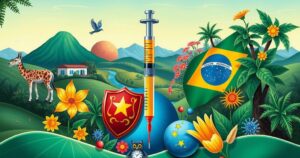Navigating Existential Threats: The Role of Horror in Public Health and Resilience

In this article, Dr. Neil Vora discusses how his experiences dealing with public health threats, including Ebola and COVID-19, have led him to seek solace in horror narratives involving contagions, particularly zombies and vampires. He examines how these genres reflect our societal fears regarding pandemics and environmental degradation, while also cautioning against succumbing to nihilism. The article highlights the need for optimism and resilience in addressing global challenges, supported by human ingenuity and advancements in science.
The film “Outbreak” profoundly influenced my trajectory, instilling in me a fascination for infectious diseases and the pursuit of public health. For over a decade, I have had the honor of realizing that passion through my work at the Centers for Disease Control and Prevention (CDC) and now with Conservation International. My journey has included responding to severe Ebola outbreaks, overseeing COVID-19 contact tracing in New York City, and addressing the public health implications of environmental degradation. Although my chosen profession brings me immense fulfillment, grappling with existential threats such as pandemics and climate change often generates anxiety. To cope, I find solace in horror narratives, particularly those involving contagions, which permit me to confront societal fears without direct implications. The rise of zombie-themed post-apocalyptic media aligns with my professional experience, illustrating complex issues such as zoonotic disease spillover and climate-related biological threats. Works like “28 Days Later” and the HBO series “The Last of Us” serve as reflective lenses through which to interpret our collective fear of increasing infectious disease outbreaks and environmental crises. However, such horror portrayals may lead to despair when consumed uncritically, which is detrimental in these tumultuous times. Historically, folkloric fears—exemplified by vampire lore—often arose from misunderstood diseases like rabies and tuberculosis. Reimagining these narratives, I draw parallels to present-day anxieties, noting that our culture’s frenzy surrounding fearful creatures has expanded proportional to the global threats we now face. Nonetheless, pessimistic outlooks are unsubstantiated; humanity has consistently showcased resilience and innovation in overcoming adversities. Scientific advancements and progressive societal changes highlight our ability to tackle pressing issues, such as poverty and climate change, demonstrating that there is hope amidst our fears. In conclusion, horror stories, while illuminating the depths of our fears, should also encourage motivation and resilience. A future reimagining—rooted in optimism as well as awareness—holds the potential to foster societal transformation. As history shows, human beings have triumphed over existential threats, and with concerted efforts, we can continue to combat the real terrors we face today. We must not lose sight of our capabilities in the face of adversity as we navigate the challenges ahead, particularly those arising from the intertwining realms of health and environmental sustainability.
The background of this article involves the intersection of public health, cultural responses to existential threats, and the importance of narrative in shaping societal understanding of fears. The author, Dr. Neil Vora, shares his personal experiences and professional journey in combating infectious diseases, linking these to broader themes within horror fiction. Notably, the text addresses how historical contexts influenced cultural fears through legends, such as vampires, arising from diseases like rabies and tuberculosis. In contemporary times, threats extend beyond local challenges to global concerns, mirroring societal anxieties about health and ecological stability, underscoring the need for critical engagement with narratives reflecting these fears.
The narrative encourages a dual approach that appreciates horror stories as reflective tools of our anxieties while also emphasizing the necessity of hope and solutions to address current global challenges effectively. By balancing dread with optimism, we can reframe our understanding of challenges as opportunities for ingenuity and resilience, fostering a renewed commitment to confronting contemporary crises with appropriate strategies and collective action.
Original Source: atmos.earth








